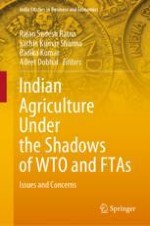2021 | OriginalPaper | Chapter
3. Revisiting the Question of Price and Income Support to Agriculture
Authors : C. Saratchand, Simin Akhter
Published in: Indian Agriculture Under the Shadows of WTO and FTAs
Publisher: Springer Singapore
Activate our intelligent search to find suitable subject content or patents.
Select sections of text to find matching patents with Artificial Intelligence. powered by
Select sections of text to find additional relevant content using AI-assisted search. powered by
